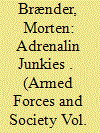| Srl | Item |
| 1 |
ID:
143278


|
|
|
|
|
| Summary/Abstract |
This article calls for military sociologists to contribute to the study of excitement motivation. Bravery has always played a dominant role in depictions of soldiers in popular culture, and the importance of concepts similar to excitement has been recognized in disciplines adjacent to sociology for decades. Given the transgressive nature of combat, we would intuitively expect soldiers to have their need for thrilling experiences satisfied during deployment, and hence their level of excitement motivation to have decreased when they return from war. However, the opposite seems to be the case. Soldiers return wanting more, and we lack a theoretical explanation why this is the case. This article starts closing this gap by offering one possible reason. And, most importantly, it calls for other researchers to offer other explanations as well. The explanation suggested here is that just like real drug addicts build up a physiological tolerance to narcotics, soldiers can become “adrenalin junkies” because their tolerance toward excitement is “pushed upward” by being exposed to danger. This explanation is tested, and finds partial support, using panel data with soldiers from two Danish companies, serving in Helmand, Afghanistan in 2011.
|
|
|
|
|
|
|
|
|
|
|
|
|
|
|
|
| 2 |
ID:
172167


|
|
|
|
|
| Summary/Abstract |
An important puzzle in the study of political violence is why individuals risk their lives fighting for a public good, when they can free-ride and enjoy the same benefits if others take the risk. This logic is particularly important to rationalist theories, which view risk as an inherent cost to violent armed group participation—which has to be offset by selective incentives, peer pressure, or coercion. This perspective has widely contributed to the understanding of violent conflict, but ignores key insights from psychology. What if risk is not a cost and instead attractive? In this article, I argue that people with a sensation seeking personality—interested in novel and intense experience and willing to accept risk for the sake of it—are more likely to join armed groups. Preliminary survey evidence comparing voluntarily and forcibly recruited members of Colombian armed groups supports my argument. The re-interpretation of a series of existing studies on Colombian guerrilla and paramilitary fighters illustrates the pervasiveness and varying manifestations of sensation seeking. Personality traits are an under-recognized ingredient in the process of joining armed groups and complement our current understanding, which is mainly determined by contextual conditions and situational motivations.
|
|
|
|
|
|
|
|
|
|
|
|
|
|
|
|